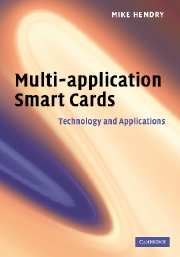Book contents
- Frontmatter
- Contents
- Foreword by Kevin Gillick
- Acknowledgements
- Part I Introduction
- Part II Technology
- Part III Business requirements
- 13 Common business requirements
- 14 Telecommunications
- 15 Banking
- 16 Transportation
- 17 Government and citizens' cards
- 18 Campus cards and closed user groups
- Part IV Implementation
- Appendix A Glossary
- Appendix B Further reading
- Appendix C Standards
- Index
- References
17 - Government and citizens' cards
from Part III - Business requirements
Published online by Cambridge University Press: 11 August 2009
- Frontmatter
- Contents
- Foreword by Kevin Gillick
- Acknowledgements
- Part I Introduction
- Part II Technology
- Part III Business requirements
- 13 Common business requirements
- 14 Telecommunications
- 15 Banking
- 16 Transportation
- 17 Government and citizens' cards
- 18 Campus cards and closed user groups
- Part IV Implementation
- Appendix A Glossary
- Appendix B Further reading
- Appendix C Standards
- Index
- References
Summary
Any card issued by a central or local government is liable to be branded as an ‘identity card’. In many Western liberal countries that poses automatic grounds for suspicion of the issuer's motives; this chapter explores some of these motives and the issues surrounding government-issued cards.
Databases and cards
All card systems depend on a central database in some form. But for government cards in particular, it is important to distinguish card projects from the databases that underlie them. The growth in government ID card projects has been accompanied by growing concerns, from civil liberties groups in particular, about the potential loss of privacy these projects entail, and the potential for abuse and discrimination.
In practice, the use of large-scale databases is expanding strongly and does offer some scope for abuse; a correctly implemented card system linked to these databases offers the potential to control access to the data and give individuals more power over the way their own data are used. It is ironic that much of the opposition to identity cards implies that the use of a card represents an infringement of privacy, whereas a well-implemented card system should actually help to manage the privacy risk and to give citizens a degree of control over access to their records that they are unlikely to gain without such a card.
- Type
- Chapter
- Information
- Multi-application Smart CardsTechnology and Applications, pp. 181 - 200Publisher: Cambridge University PressPrint publication year: 2007



